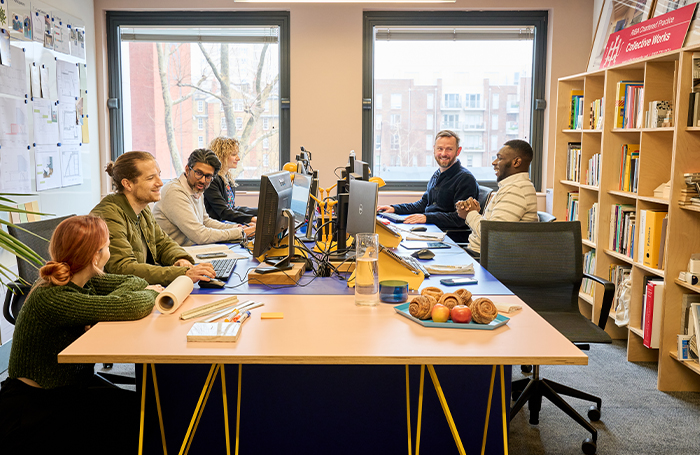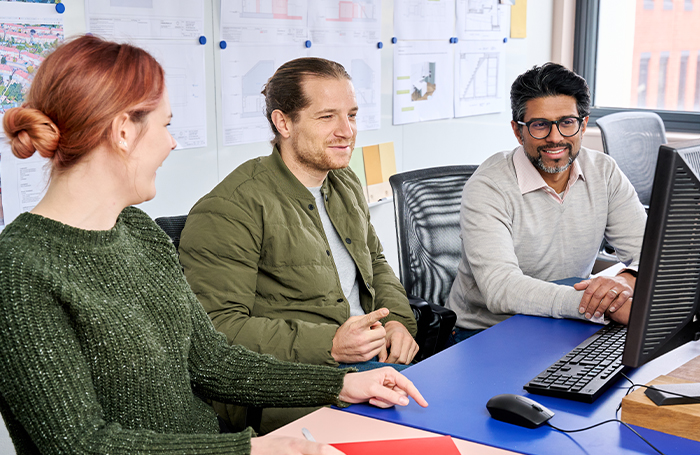This month, RIBA London spoke to the partners of Collective Works, who are motivated by the relationships they form and the social value which their work generates.
Alasdair Ben Dixon, Khuzema Hussain, and Siri Zanelli co-founded the practice and ensure that projects consider impact on the planet as well as on the wellbeing of occupants.
Good relationships build good buildings, so they strive to listen - and really hear from - the various stakeholders involved in each project. Collaboration, flexibility, and professional ethics underpin their approach.
Their design process considers both embodied carbon and the many stakeholders involved in each project. It embraces design informed by nature, colour, and material. Collective Works applies these to make spaces which are not just functional, but also evoke emotion.
They are currently working with homeowners, developers, the NHS, and community groups on a broad range of projects. The practice is also a signatory to Architects Declare, the RIBA 2030 Climate Challenge, and the UN Race to Zero.

What do you think is the most important issue for architects to focus on right now, and what are you doing as a practice to tackle it?
There are a myriad of issues currently facing architects and society at large, many of which have been discussed and debated within the profession since the early 1970s. Arguably the most important is the climate and biodiversity emergency, which is already destabilising the very ecosystems on which all of life depends.
Like many others, as a practice, we set out to be the change we wanted to see in the industry. This started by championing a remote-first approach (long before the pandemic), finding time every year to work on community-led projects, and doing our best to understand the impact of our work, even on relatively small projects.
Internally, we also practice transparency, with balanced salaries for our team benchmarked against the industry.
We know that as a small practice, our projects will have limited impact, so beyond the confines of our office we call for changes in the system and more collective action. Part of that advocacy led us to co-author RIBA’s Ethical Practice Guide, which combines some of our experience as a practice with a wealth of expert views and frameworks.
What do you think architecture practices need most support with during this recession?
Practices shouldn’t be afraid to innovate during difficult times. We were born during a recession and used the opportunity to build a network of talented collaborators. We were able to test new ideas, working methods, and build relationships that remain important to the practice to this day.
We’d also encourage more knowledge-sharing and transparency. We’ve gained valuable insight through the many networks which emerged during the pandemic. Whether it’s advice on business challenges, confronting the climate emergency, or supporting the drive for inclusion, there’s a passionate group tackling the issues and looking for support.
Lastly, the profession will benefit if we all continue to uphold standards as best we can. Clients and the wider public should be able to rely on architects to remain independent in their decisions - so let’s be known as advocates working to reduce harms. This means speaking up in meetings where standards are being eroded or risky decisions are signed off.
What resources do you think would be beneficial for practices that are in the process of becoming more sustainable?
As with other challenges, practices should look beyond their own office and find common ground with others tackling this.
There’s a wealth of resources made available by Architects Declare, including the Practice Guide, and five masterclasses on transforming your practice.
We helped develop these and were pleased to see them also influence the RIBA Sustainable Business Toolkit
Off-screen we're currently reading:
- It's Not That Radical, Climate Action to Transform Our World
- RIBA Climate Guide
- Flourish, Design Paradigms for Our Planetary Emergency
- Collective Action!, The Power of Collaboration and Co-Design in Architecture
Beyond these, it’s really about finding allies on your project team to work with and improve things. Clients, contractors, engineers, planners - they all have reasons to prioritise sustainable construction. While they might not be the same as ours, have that discussion and find out.

How do you think we can make architecture more accessible to people of all backgrounds?
Firstly, understand the diversity present within your practice and compare that with the context you work in. By diversity, we don’t just mean gender, race, and age, but also neurodiversity, sexual orientation, class, and other characteristics protected under the Equalities Act.
You’ll often find yourself working with people who are quite different to you, so consider how you relate to them and how best to understand the lived experiences of the people you're designing for.
Secondly, when improving the diversity within your practice, don’t presume that representation will change things overnight. Work to create a culture which is welcoming to all and is meaningfully improved by new perspectives.
Lastly, wherever possible, create spaces in dialogue with the surrounding community and seek out the local protagonists whose stories should influence the project. They’ll be the ones who keep the building inhabited long after construction is complete.
What’s the most exciting project you’ve got coming up and why?
The Quiet Room. We’re working to improve the interior of a small but important room on the critical care ward at North Middlesex Hospital. This room is where friends and relatives of patients will rest and wait for news about their loved ones.
Having spent quite some time in a similar setting last year, we’re keen to improve the experience for the benefit of everyone in those situations. We’re improving the furniture, colour palette, and lighting, and adding some natural biophilic features to create more comfort for everyone.
Another project is Sustainable Masterplans. We’re excited to be getting involved with two masterplans to create health retreats. One is in the UK and one is overseas. We can’t say too much sadly, but look forward to sharing as the schemes develop.
Finally, BADU Sports. We’re working with this inspiring CIC in Hackney to develop a Centre of Excellence. Their mission is to transform the UK elite sports pathway and empower more women to flourish, especially those from diverse backgrounds. So far, we’ve had a successful fundraiser, consultation, and pre-app. More news soon.
Where do you look for inspiration?
We’ve made it our mission to create responsible and beautiful work.
We’ve recently set an intention to recognise beauty more clearly and contribute to the ongoing discussion about it. We can appreciate it in many of the places we live our lives, and often those we travel to – the mountains, forests, cities, and villages.
Beyond places and spaces, we find it in the novels, music, art, and social movements of today. By seeking out beauty in our immediate surroundings, we are reminded to always pay attention and to be present.
As we run Collective Works - which is a constant work in progress - we also look to the business leaders and thinkers who boldly stand by their values and dare to create the world they want to live in.
To find out more about Collective Works, visit the Collective Works website or connect with them on Instagram or LinkedIn.









